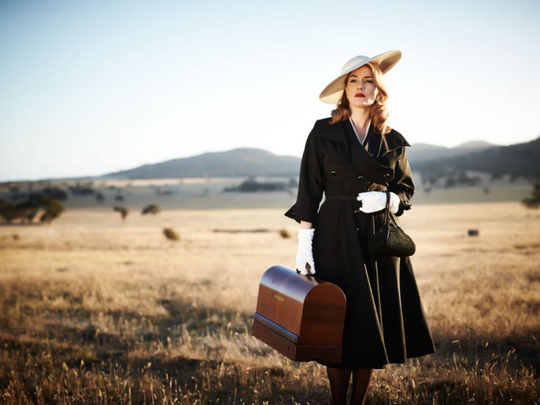
Jocelyn Moorhouse returns to the director’s chair with a wiggle dress and a powder keg after almost two decades for The Dressmaker — a loud, batty, fancy-frocked, sashed-and-stockinged revenge story pitched somewhere between an outback period piece and a Wile E. Coyote cartoon.
The film-maker’s adaptation of author Rosalie Ham’s much-loved debut novel of the same name embraces its dark humour and runs with it all the way to the morgue. Moorhouse stitches together a take-down of one of Australian cinema’s well-worn story outfits: the tale of someone returning to the small town community they grew up in and dealing with baggage left behind. In this instance the drama is less about healing old wounds than sending old grievances to kingdom come.
Ham’s book was a structurally and tonally uniform affair: utterly consistent stylistically, and with seductively quaint prose. Moorhouse’s film bounces around like a pogo stick, careening between genres and mood, bound by its cast and postcard-perfect cinematography from veteran Donald McAlpine.
Myrtle “Tilly” Dunnage (Kate Winslet) returns to her home town of Dungatar armed with wicked seamstress skills (says Moorhouse: this is “Unforgiven with a sewing machine”) after a period studying haute couture in Paris. She gets off the bus sucking on a ciggie, declaring “I’m back, you bastards.”
Her rage is subdued for a long time as the plot revolves around Tilly caring for her wheelchair-bound piece-of-work mother, Molly (Judy Davis), while making outfits for the town populace and attracting the hunky manhood of a Hemsworth brother (Liam, looking like he’s leapt from the pages of a Mills and Boon romance novel).
Winslet is in fine form as Tilly but Davis runs away with it — she’s erratic, shrewish and scene-dominatingly mental, somewhere between crazy cat lady and drunken aunty at a wedding.
There’s a backstory, illustrated in washed-out looking flashback scenes, gradually explaining the reason Tilly was ostracised. One of the most potentially interesting characters — and an embodiment of the film’s silly charm — is cross-dressing cop Sergeant Farrat (Hugo Weaving). He is mysteriously relegated to the peripheries; one imagines Farrat spending his off-screen time adjusting his eyeliner and cooking up plans to star in a spin-off.
Co-adapted by Moorehouse and her husband/fellow film-maker PJ Hogan (director of Muriel’s Wedding and Confessions of a Shopaholic), the storyline feels a little at sea, like it’s in an ongoing process of second-guessing itself.
But the wait is worth it: the final half hour catches fire and sends any notion of quaint storytelling to hell in a (fancily hemmed) handbasket. The sight of a hunchbacked Barry Otto falling into a pond earmarks one delirious stretch of crazy-in-the-coconut cinema.
The Dressmaker might have been the mother of all outback small town movies if director Stephan Elliott hadn’t spat out 1997’s explosively kitsch Welcome to Woop Woop.
In a sense, Moorehouse’s film arrives two decades too late. It would have sat like a perfectly fitted corset with hyper Australian quirk cinema dished up in the 1990s with movies such as Woop Woop, The Adventures of Priscilla: Queen of the Desert, Muriel’s Wedding and Bad Boy Bubby. Like The Dressmaker, these films have an anarchic and destructive quality: they seem happy to watch the world burn while dancing — or at least looking fabulous — in its ashes.
— Guardian News & Media








